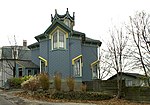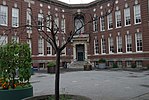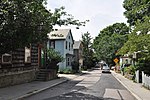MSPCA-Angell

The Massachusetts Society for the Prevention of Cruelty to Animals-Angell Animal Medical Center (MSPCA-Angell) is a 501(c)(3) non-profit organization with its main headquarters on South Huntington Avenue in the Jamaica Plain neighborhood of Boston, Massachusetts. It was founded in 1868, and is the second-oldest humane society in the United States. "MSPCA-Angell" was adopted as the society's identity in 2003, and indicates the names of its two closely related predecessor organizations: Massachusetts Society for the Prevention of Cruelty to Animals and Angell Animal Medical Center (formerly known as Angell Memorial Animal Hospital). The organization provides direct care to thousands of homeless, injured, and abused animals each year, and provides animal adoption, a veterinary hospital, advocacy, and humane law enforcement.
Excerpt from the Wikipedia article MSPCA-Angell (License: CC BY-SA 3.0, Authors, Images).MSPCA-Angell
Perkins Street, Boston Jamaica Plain
Geographical coordinates (GPS) Address Nearby Places Show on map
Geographical coordinates (GPS)
| Latitude | Longitude |
|---|---|
| N 42.3229 ° | E -71.111 ° |
Address
Perkins Street
02120 Boston, Jamaica Plain
Massachusetts, United States
Open on Google Maps










